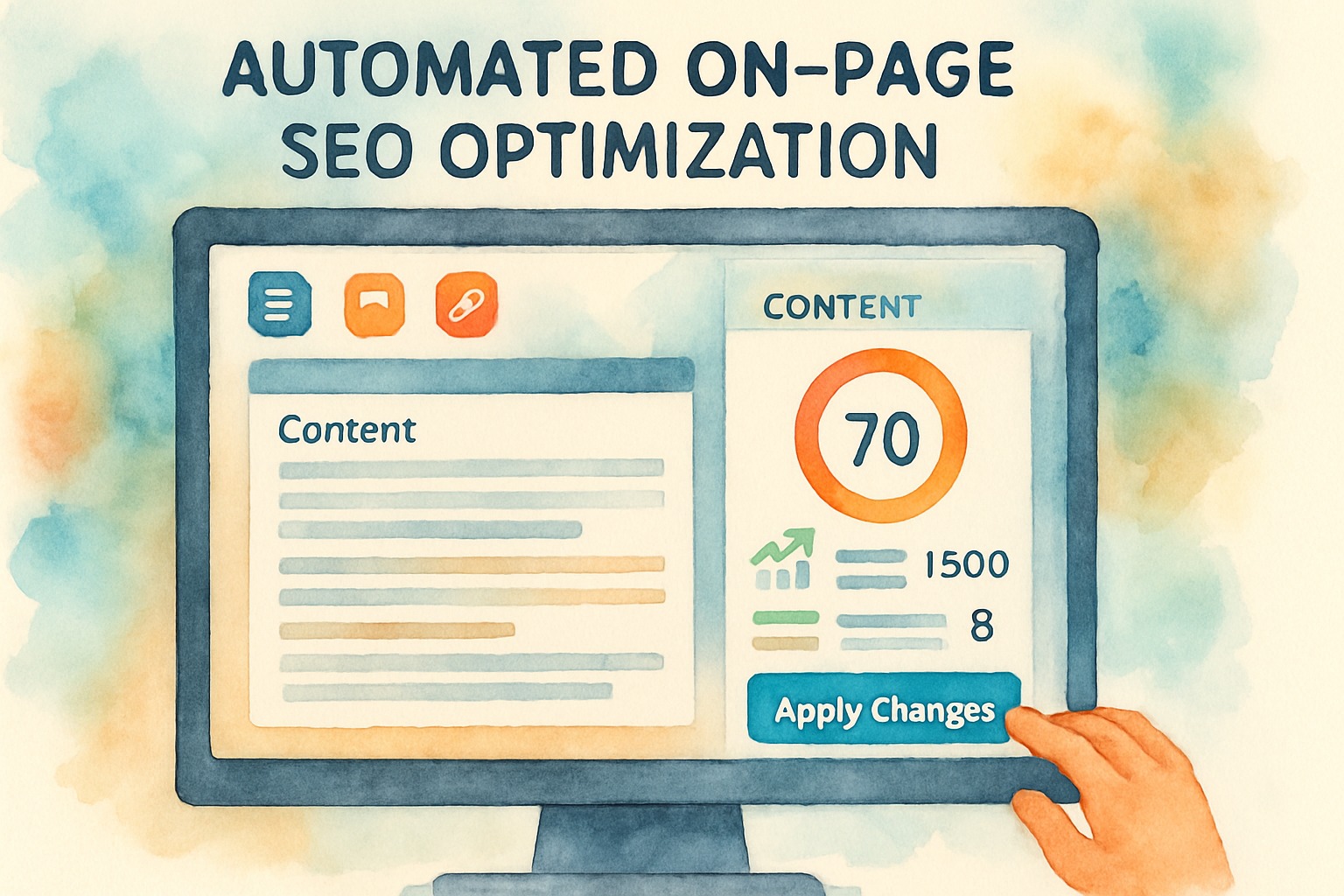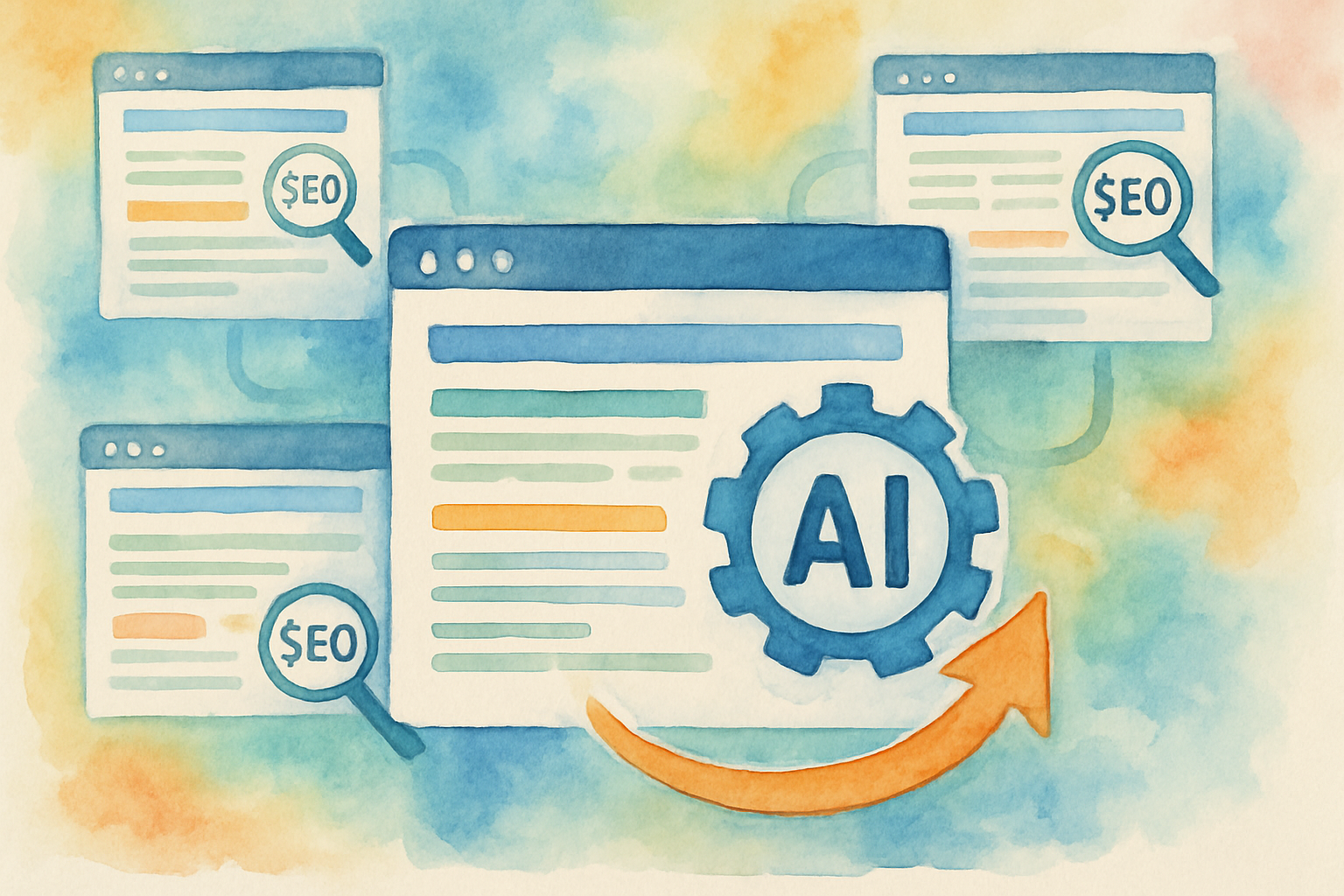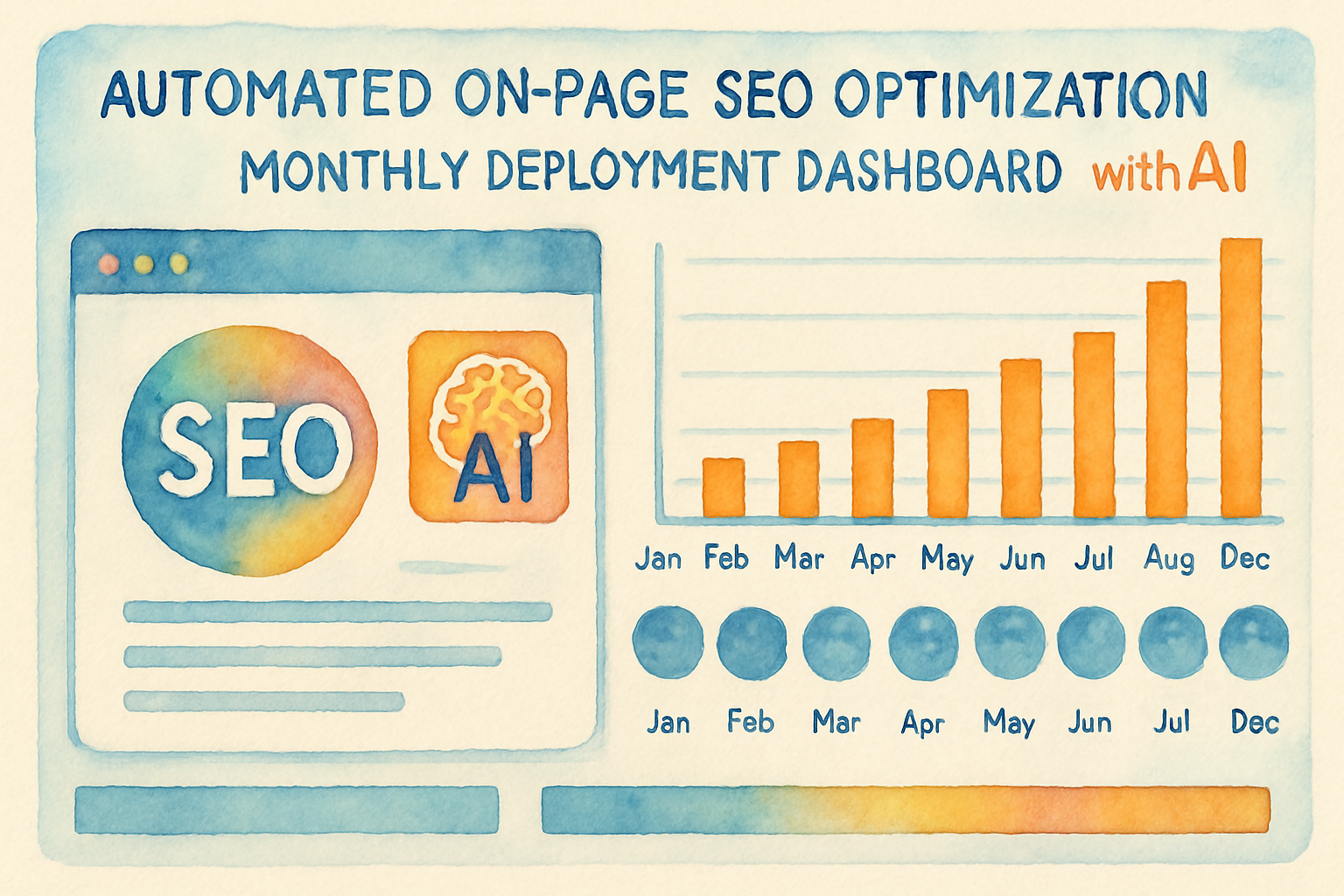Automated on page SEO optimization with AI is transforming digital marketing at an unprecedented pace.
But how exactly can AI streamline and scale on-page SEO tasks?
Here's your complete guide that breaks down the essentials of AI-powered on-page SEO automation.
Some are game-changing AI algorithms that analyze content intent in seconds.
Some are tools automating tedious repetitive SEO chores across hundreds of pages.
Some are strategies integrating AI insights with human creativity for the best outcomes.
Some are emerging trends adapting SEO for new AI-driven search behaviors.
Some are concrete examples of businesses scaling their SEO efforts using AI automation.
Let's dive right in.
What is Automated On Page SEO Optimization with AI?
Automated on-page SEO optimization with AI refers to using artificial intelligence tools to improve website elements that affect search engine rankings—automatically and at scale.
This includes optimizing meta titles, descriptions, header tags, internal linking, keyword usage, content structure, and even technical SEO checks.
AI tools leverage machine learning and natural language processing (NLP) to understand user intent, parse competitors' top-performing content, and provide targeted recommendations or implement changes.
Where manual SEO might take hours per page, AI can optimize hundreds of pages quickly, consistently applying best practices without losing quality.
This approach frees marketers from tedious tasks and lets them focus on strategic growth and creativity.
The rise of AI SEO automation tools is revolutionizing content marketing by boosting organic search rankings and user engagement efficiently (source).

How Can AI Transform Your SEO Workflows?
AI transforms SEO workflows through several powerful capabilities:
- Keyword research: AI tools analyze search intent, semantic contexts, and keyword difficulty, uncovering hidden long-tail terms and competitive gaps (source).
- Content optimization: Using NLP models, AI evaluates your content’s tone, structure, and keyword integration to match search intent and boost relevance.
- Automated meta tag generation: AI creates optimized titles and meta descriptions tailored for click-through improvement at scale.
- Internal linking automation: AI maps related content and introduces strategic internal links that enhance crawlability and user navigation.
- SEO audits and issue detection: AI rapidly scans sites for technical errors like broken links, slow loading, missing alt tags, or improper canonical tags and prioritizes fixes (source).
- Performance monitoring: AI tracks key SEO metrics, user engagement, and content rankings, highlighting areas that need improvement or updating.
By automating these repetitive or complex tasks, AI increases efficiency and consistency, especially useful for managing large websites or multiple clients.
Practical Example: Real-World Success with AI in SEO
For instance, Rocky Brands, a footwear retailer, implemented AI-powered tools like BrightEdge to prioritize SEO content and strategies.
They saw a 30% jump in search revenue and 74% year-over-year growth—all while reducing manual SEO overhead significantly (source).
Which AI SEO Tools Are Leading the Market Today?
The market for AI SEO tools is vibrant and growing fast. Some top contenders include:
- Ollie AI: Mass on-page optimization, live front-end editing, and bulk rule application make it perfect for scaling automated SEO changes efficiently.
- Semrush: An established brand integrating 76 AI-powered tools from keyword research to content optimization and competitive insights.
- Surfer SEO: Uses NLP to compare your pages against competitors and suggests ideal keyword usage, content length, and structure.
- Frase.io: Creates SEO content briefs and performs competitor analysis to help optimize pages for target keywords.
- SEO Scout: Specialized in running A/B tests on titles and snippets, helping select versions that improve click rates.
Choosing the right tool depends on your business needs, scale, and workflow integration. Many of these platforms offer free trials to experiment first-hand (source).
How to Implement Automated AI SEO Optimization Effectively
While AI can do much of the heavy lifting, success depends on strategic integration and human oversight.
- Audit current SEO status: Use AI-powered SEO audits to identify key technical and content issues across your site.
- Select tools suitable to your objectives: Match tool capabilities with your content types, industry, and volume.
- Integrate automation gradually: Start automating lower-risk tasks like meta tags and internal linking before handling core content edits.
- Maintain quality control: Always review AI-generated or modified content to ensure authenticity, contextual accuracy, and voice alignment.
- Leverage AI insights to inform strategy: Use AI analytics to focus on high-impact SEO fixes, identify content gaps, and forecast trends.
- Update content regularly: Automated refreshes driven by AI maintain SEO freshness and user relevance.
- Invest in training and skills: Ensure your SEO team understands how AI works and complements their expertise.
This balanced approach maximizes AI benefits while guaranteeing top content standards and user experience.
What Are Best Practices for Scalable On-Page SEO Automation?
Businesses managing large content libraries must consider several critical practices:
- Consistency: Enforce site-wide rules for title tags, headings, and meta descriptions to preserve branding and SEO coherence.
- Structured data use: Implement schema markup to boost eligibility for rich results and AI snippet inclusion.
- Duplicate content avoidance: Use canonical tags and hreflang correctly to prevent SEO dilution.
- Monitoring and testing: Regularly run AI-generated A/B tests and SEO reports to track what's effective and pivot accordingly.
- Prioritize page speed and mobile usability: Technical SEO fundamentals remain important in AI-powered SEO (source).
- Human oversight: Combine AI automation with editorial review to ensure content remains natural, engaging, and authoritative.
Scaling doesn't mean compromising quality; successful AI SEO harmonizes efficiency with excellence.

How Do AI-Powered Search Engines Impact SEO Strategies?
Modern AI search engines, including Google's AI overviews and ChatGPT-style assistants, change the SEO landscape dramatically.
Instead of just traditional search results, users receive AI-generated answers summarizing content from multiple sites.
This shifts user behavior: impressions may rise, but direct clicks can decline because questions get answered instantly by AI.
SEO strategies now have to:
- Focus more on high intent, long-tail keywords that AI tools use as data points.
- Structure content to answer questions concisely at the start and provide detailed sections to support AI validation.
- Build brand reputation and trust signals since AI selects authoritative sources to cite.
- Combine efforts across platforms like YouTube, Amazon, and social channels where search queries originate (source).
This means a dual-approach: optimize for AI overview recommendations while maintaining bottom-of-funnel SEO to drive conversions.
Should You Fully Rely on AI for Automated SEO?
No automation works best when combined with human insight.
AI excellently handles large-scale analysis, tedious updates, and pattern detection but lacks nuanced judgment on brand voice, audience subtleties, and evolving search contexts.
Examples include:
- Content authenticity and ensuring it doesn’t feel robotic.
- Adjusting tone or storytelling to fit culture and brand personality.
- Detecting subtle SEO risks that AI might overlook.
Successful SEO combines AI speed with skilled marketers' creativity to craft memorable and authoritative web presence.
How to Monitor and Measure AI SEO Performance?
AI technologies generate vast performance data, making it crucial to interpret it effectively:
- Use Google Search Console and AI-powered analytics tools to track ranking fluctuations, CTR, and traffic.
- Evaluate AI-referral traffic by filtering acquisition sources to know how much users come from AI search results.
- Compare A/B test results of meta titles and descriptions to see what gains more clicks.
- Analyze user engagement metrics like bounce rates and session duration to assess content quality impact.
- Review competitor strategies with AI tools to find new opportunities or risks.
- Continuously refine SEO tactics based on AI-driven insights and changing algorithms (source).
Can Anyone Implement Automated AI SEO Optimization?
Yes, with the right approach, both small businesses and enterprises can adopt AI for on-page SEO automation.
Smaller sites benefit by saving time on routine tasks and competing more effectively.
Larger enterprises leverage AI's scalability to manage massive content volumes without sacrificing quality.
However, selecting appropriate AI tools aligned to business goals and providing adequate team training is vital.
For beginners, platforms like Search Atlas even offer SEO autopilot features that auto-apply optimization monthly with minimal setup (Learn to automate SEO content creation).

Frequently Asked Questions
What tasks can AI fully automate in on-page SEO?
AI can handle meta tag optimization, keyword placement, content structure recommendations, internal linking, schema markup, and technical SEO audits.
Will automated AI SEO replace human SEO experts?
No. AI complements human expertise by managing scale and routine tasks while humans focus on strategy, creativity, and quality control.
How to choose the best AI SEO tool for my business?
Evaluate tools based on features, ease of integration, scale needs, budget, and available support. Trial periods help test fit before committing.
Can AI optimize content for voice and visual search?
Yes. AI identifies conversational queries and suggests FAQ formatting for voice, plus optimizes alt text and video transcripts for visual search.
Navigate Automated AI SEO with an Effective Strategy
To fully benefit from automated on page SEO optimization with AI, combine technology, data insight, and best practices:
- Create an audit roadmap focusing on most impactful SEO fixes.
- Integrate AI tools into your workflow with clear objectives.
- Optimize for AI-powered search results and traditional organic listings concurrently.
- Maintain ongoing performance monitoring and iterate strategies.
- Keep content human, authoritative, and trustworthy to build brand reputation.
- Explore cross-channel SEO, including video and social SEO, for holistic reach.
- Stay informed about SEO trends and AI advancements to adjust tactics promptly (source).
Consider exploring how to master content marketing strategy to complement your AI SEO automation efforts with engaging storytelling and audience insights.
What's Your Next Step?
Tell us in the comments: How will you apply automated on page SEO optimization with AI to your site or business?
For personalized advice and strategic insight, contact us!